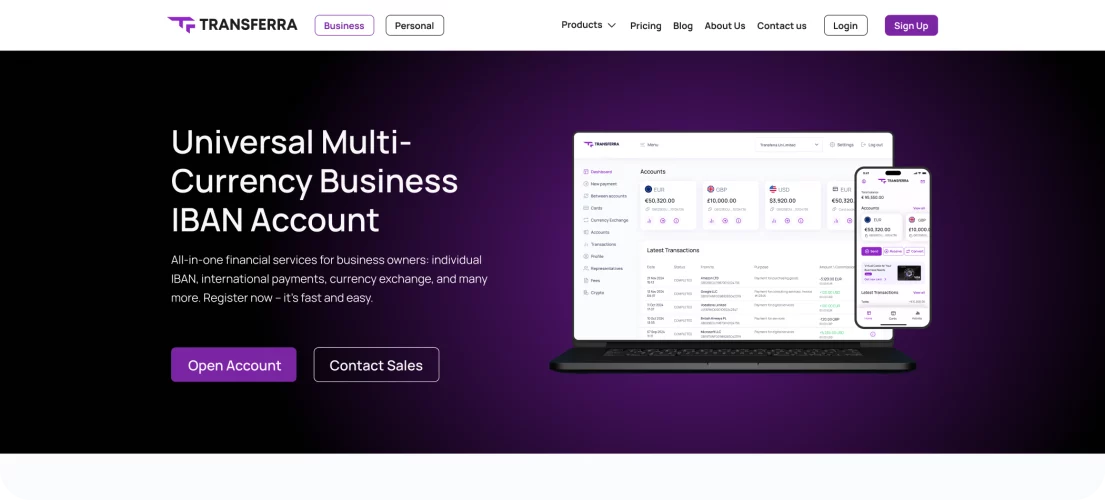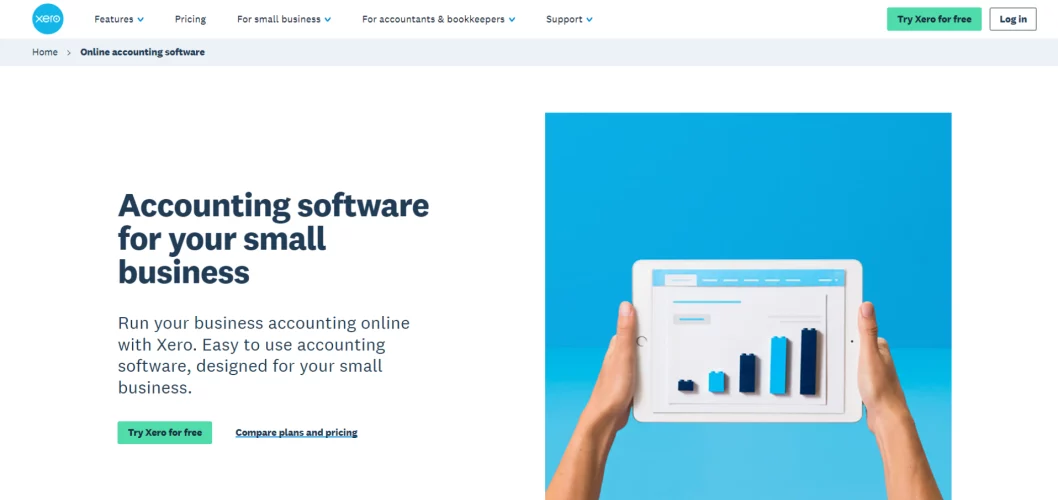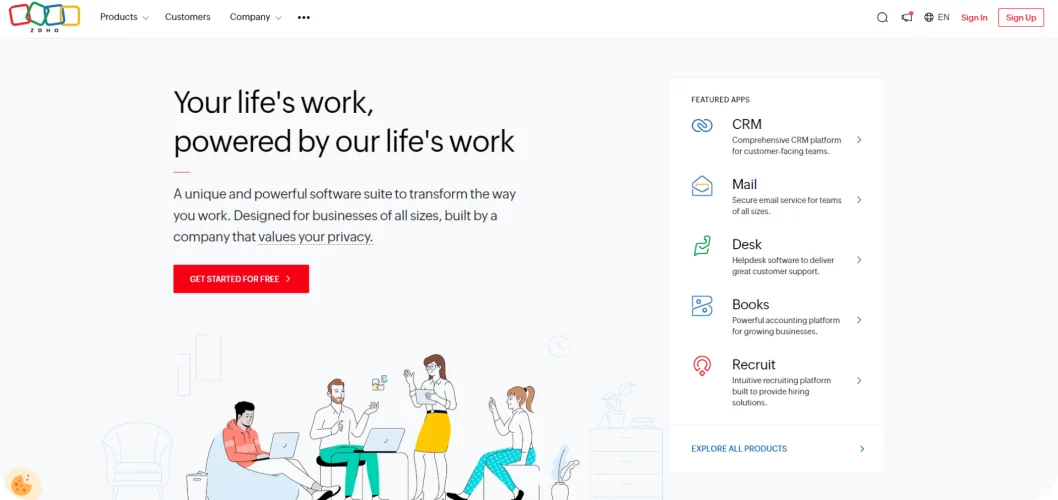5 Best Business Tools to Help Your Startup Grow in 2025
Are you launching your startup and unsure which tools will help you grow? With countless business solutions out there, finding the right ones can be challenging. In this article, we’ll explore the essential tools that can set your business up for success.
Launching a startup is an exhilarating adventure filled with opportunities and challenges. However, it’s not without its challenges. One key factor that will make or break the success of your business is choosing the right tools and platforms to manage all the moving parts of your company. Historically, startups have relied on outdated systems to manage their businesses—banks to handle finances and spreadsheets to manage data. However, these traditional methods often fall short, being inflexible, expensive, and time-consuming.
Fortunately, the startup landscape has been dramatically shifted by technology-based solutions, specifically fintech and business platforms. These modern tools are designed to automate, streamline, and simplify many aspects of running a business, freeing up time to focus on growth and strategy. From flexible banking to advanced CRM systems, startups now have access to a wide range of powerful resources to help them scale.
In this article, we’ll explore how business solutions are helping startups run their operations. Whether you’re looking for premium banking, user-friendly accounting software, a social media management platform or a CRM system, the following platforms offer the tools you need to succeed.
How Technology Helps Startup Growth
From fintech platforms to CRM systems, modern business solutions are necessary for startups that want to overcome outdated hurdles and achieve real scale. Here’s how they help entrepreneurs:
- Streamlined Operations: Automate tedious processes like bookkeeping, payroll, and customer management to save time and resources.
- Scalability: Choose platforms that grow with you, handling increased transaction volumes, larger teams, and complex operations.
- Faster Decision-Making: Access real-time insights and data to inform business strategy.
- Enhanced Customer Management: Leverage CRM tools to build stronger relationships, improve customer satisfaction, and drive sales.
When you combine these tools, you can focus on what’s important—growing your business and innovating—instead of getting bogged down in inefficient operations.
Why Business Solutions Are Essential for Startups
Startups face a range of hurdles, from finances to customer relationships and workflow. Business solutions provide a modern fix for outdated practices and effectively solve many common pain points:
- Cost: Many platforms offer affordable monthly subscriptions instead of expensive upfront costs.
- One-Size Doesn’t Fit All: Customizable solutions can accommodate a range of industries and business models.
- Labor: Automation eliminates busywork, so you can focus on what matters.
- Outdated: Obsolete methods are prone to human error and often don’t meet industry standards.
When you have the right tools, you can build a solid foundation for long-term success.
Outdated Banks Are a Headache for Startups
Startups often find traditional banks to be inflexible and inconvenient. Here are a few common issues:
- Fees: Many banks charge high fees for maintenance, transfers, and other services. As a startup, you can’t afford to waste precious budget on unnecessary expenses.
- Paperwork: Opening a business bank account or applying for a loan often involves lengthy paperwork and approval processes that can hold you back during the early days of your business.
- Lack of Scale: Outdated financial services often aren’t equipped to handle the unique needs of startups. They may not be able to adapt to increased transaction volumes, offer multiple currencies, or accommodate complex international operations.
What are the best business tools for starting your startup?
1. Transferra: Premium Financial Solution for Entrepreneurs

When it comes to banking, startups need a partner that can handle all the financial aspects of their business while providing the flexibility to scale. Transferra stands out as a premium fintech solution for entrepreneurs and businesses at any stage. With Transferra you can obtain your multi-currency business IBAN account and start sending and receiving payments to over 180 countries in 30+ currencies.
Transferra’s Top Features
- Flexible Payment Solutions: Transferra offers a range of payment options, including SWIFT, SEPA, Faster Payments, Bacs, and Chaps, designed to accommodate the specific needs of startups.
- Dedicated Customer Support and Personalised Guidance: New companies often face unique challenges, and Transferra’s support team is ready to assist with tailored advice and solutions to help businesses thrive.
- High Limits, No Restrictions: Transferra gives startups the ability to make high-volume transactions without restrictions so that they can run their business freely.
- Cards with Apple Pay & Google Pay: Transferra’s debit cards are compatible with Apple Pay and Google Pay, making it easy to manage expenses and track business spending.
- Intuitive Mobile Apps: With dedicated iOS and Android applications, Transferra allows startups to stay in control of their finances anytime, anywhere, offering real-time access to critical banking features.
Transferra pricing
Contact Transferra sales managers to receive a custom offer based on your business requirements.
Transferra’s flexibility, security, and user-friendly design make it the perfect tool for businesses. With high transaction limits, personalised support, and innovative digital features, it’s the ideal partner for entrepreneurs who want a financial solution that can grow with their business.
2. Xero: Online Accounting Made Easy

For businesses, maintaining clear and organized financial records is crucial for success, especially when resources are limited, and every decision matters. Xero is a powerful online accounting software that helps entrepreneurs and small businesses take control of their finances.
Key Features of Xero
- Customisable Invoices: Create professional, branded invoices and set automated reminders for late payments.
- Payroll: Process payroll directly within the platform to ensure on-time payments and meet tax compliance.
- Expense Tracking: Xero makes it easy to track expenses by linking bank accounts and uploading receipts directly to the system.
- Financial Reports: Generate in-depth reports on profitability, cash flow, and more. Customisable dashboard widgets give startups the keys to performance metrics so you can track what matters most.
- Integrations: Xero integrates with over 1,000 third-party apps, including CRM systems, payment gateways, inventory management, and more, making it a centralised hub for all your financial needs.
Xero pricing
Xero offers three plans, currently discounted for the first 6 months:
- Starter ($2.90/month, usually $29): Send quotes and 20 invoices, enter 5 bills, reconcile bank transactions.
- Standard ($4.60/month, usually $46): All Starter features plus unlimited invoicing, bills, and bulk transaction reconciliation.
- Premium ($6.90/month, usually $69): All Standard features plus multi-currency support.
Xero is more than an accounting solution – it’s a financial management tool. User-friendly, automated, and scalable, it’s a must-have for companies that want to free up time to focus on growth. Even if you’re not an accounting whiz, Xero makes it easy to master your finances.
3. Zoho CRM: Customer Relationship Management

Startups need strong customer relationships to survive and thrive in a crowded market. Zoho CRM is a powerful tool that helps entrepreneurs manage customer interactions and relationships so they can focus on growth. It’s a must-have fintech solution for businesses that want to increase customers and revenue.
How Zoho CRM Helps Companies
- Centralised Customer Data: Zoho CRM pulls in all customer interaction data, including emails, calls, and meetings, so you can track leads, close deals, and build strong relationships.
- Sales Automation: Automate time-consuming sales tasks like lead assignment, follow-up reminders, and more, so your sales reps can focus on closing deals and building relationships.
- Marketing Automation: Create and manage email campaigns, track performance, and analyse customer behaviour metrics. Zoho CRM’s marketing automation module integrates with Zoho Campaigns and social media tools for easy marketing execution.
- Customizable Dashboards & Reports: Get real-time sales performance, customer behaviour, and revenue metrics with customizable dashboards. Startups can track key metrics and make informed decisions with Zoho CRM’s reporting features.
- Workflows: Automate multi-step business processes, like sending notifications or updating records, based on specific criteria.
Zoho pricing
Zoho CRM offers four pricing plans billed annually or monthly:
- Standard (€14/user/month/annual): Essential features like mass email, custom fields, workflows, and sales forecasting.
- Professional (€23/user/month/annual): Adds advanced tools like Blueprints, SalesSignals, and Google Ads integration.
- Enterprise (€40/user/month/annual): Includes AI assistant (Zia), custom modules, journey orchestration, and multi-user portals.
- Ultimate (€52/user/month/annual): Advanced capabilities like enhanced feature limits, augmented analytics, and unified business insights.
- All plans include a free trial option.
Zoho CRM’s feature set makes it more than a basic CRM. It’s a sales, marketing, and customer engagement management tool. New businesses can take advantage of its affordability and scalability, starting with a basic setup and adding features as needed.
4. Asana: Project Management & Workflow Optimization

Startups often manage multiple projects and tasks, which can be overwhelming, especially in lean teams and fast-paced industries. Asana is a top project management tool that helps entrepreneurs and their teams organise workflows, stay on track, and ensure everyone is working toward the same goals.
How Asana Helps Teams
- Task Assignment & Tracking: Assign tasks to team members with deadlines and priorities, then track progress in real-time. Organisations can rest assured everyone’s on the same page and knows what’s expected of them.
- Customisable Workflow: Teams can set up workflows to fit their unique needs, whether it’s managing product development, marketing campaigns, or onboarding new team members.
- Visual Project Management: Asana provides multiple views to visualise projects, including lists, boards, calendars, and timelines. The timeline view is especially helpful for startups tackling complex projects with dependent tasks.
- Team Collaboration & Communication: Teams can comment on tasks, share files, and mention colleagues for feedback instead of clogging email inboxes. Asana integrates with popular apps like Slack and Microsoft Teams for additional communication channels.
Asana pricing
Asana offers five plans:
- Personal (€0): For individuals and small teams looking to manage their tasks.
- Starter (€10.99): For growing teams that need to track their projects’ progress and hit deadlines.
- Advanced (€24.99): For companies that need to manage a portfolio of work and goals across departments.
- Enterprise / Enterprise+ (custom): For companies that need to coordinate and automate complex work across departments, without limits.
Asana’s simplicity and scalability make it a versatile tool for companies. Begin with basic task management features and add more advanced tools as you grow. Asana helps startups avoid chaos, stay organized, and achieve goals by fostering transparency and teamwork.
5. Hootsuite: Social Media Management for Startups

For startups, building a strong online presence is essential for brand visibility, customer engagement, and growth. Managing multiple social media accounts can quickly become overwhelming, especially for lean teams. Hootsuite, a leading social media management tool, helps startups streamline their social media strategy by providing tools to manage, schedule, and analyze posts across various channels from a single dashboard.
How Hootsuite Benefits Startups
- Centralized Social Media Management: Hootsuite gives startups the ability to manage all of their social media accounts from a single platform, including Facebook, Instagram, Twitter, LinkedIn, and more. This guarantees uniformity across channels and removes the inconvenience of using multiple apps.
- Content Scheduling and Publishing: Startups can schedule posts in advance, ensuring their content reaches audiences at the most optimal times, even outside business hours.
- Analytics and Performance Insights: Hootsuite provides detailed analytics to track the performance of posts and campaigns. Startups can monitor metrics like engagement, reach, and audience demographics.
- Team Collaboration and Approval Workflows: Team members can draft, review, and approve posts within the platform, ensuring brand consistency and eliminating errors before content goes live.
- Monitoring and Engagement: With Hootsuite, startups can monitor mentions, comments, and direct messages across all platforms in real-time. This helps teams stay responsive, engage with their audience effectively, and address customer inquiries promptly.
Hootsuite pricing
- Professional ($99/month): 1 user, 10 social accounts, unlimited scheduling, analytics, AI tools, Canva integration, and post-boosting.
- Team ($249/month): 3 users, 20 social accounts, plus team collaboration, branded URLs, and link tracking.
- Enterprise (Custom pricing): Starts at 5 users, 50 social accounts, with advanced workflows, content libraries, and SSO.
- Includes a 30-day free trial.
Hootsuite’s ability to centralise, automate, and analyse social media efforts makes it a valuable startup tool for startups looking to establish and grow their online presence. By providing an organised platform to manage content and measure performance, Hootsuite helps startups save time, increase efficiency, and maximise the impact of their social media strategies.
The Right Tools for Startup Success
Starting a business is a complex endeavour that requires careful planning and the right tools to overcome common hurdles. Technology-based solutions have given startups a wealth of opportunities to streamline operations, increase productivity, and achieve real scale. By taking advantage of modern platforms, startups can free up time to focus on what matters most—innovation and strategy.
Modern fintech and business solutions address common pain points, such as financial management, workflow organisation, customer relationship building and social media management. They provide startups with the flexibility to scale operations, adjust to market changes, and compete in their industries. The tools outlined—from financial platforms to CRM and project management solutions—represent a small sample of the diverse, yet complementary technologies available to startups.
However, implementing the right tools is only half the battle. Startups must integrate these solutions seamlessly into daily operations, ensuring they align with business goals and processes. Regularly evaluating these tools and staying up-to-date on the latest technology is crucial for long-term success. The fintech and business software landscape changes rapidly, and startups must prioritise agility, adaptability, and strategic planning to remain competitive.
Ultimately, these tools are more than operational helpers; they’re strategic weapons that give startups the freedom to innovate, manage resources wisely, and chase their dreams with confidence. By taking advantage of platforms like Transferra, Xero, Zoho CRM, Asana and Hootsuite, startups can build a solid foundation, turn obstacles into opportunities, and set themselves up for long-term success.

